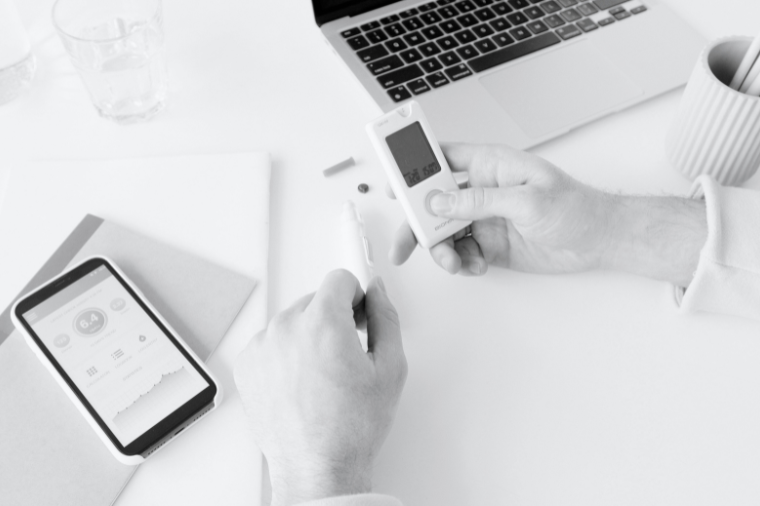Amid the growing concerns of diabetes in the UAE, GluCare.Health provides a journey like no other with cutting-edge healthcare facilities.
Diabetes is a chronic medical condition characterised by high levels of glucose (sugar) in the blood. It occurs when the body cannot produce enough insulin or effectively use the insulin it produces. Insulin is a hormone produced by the pancreas that helps regulate blood glucose levels.
Through metabolic monitoring, GluCare’s innovative technology allows customers to track their progress and provide support in real-time. Through continuous remote monitoring, clients won’t feel alone through their journey.
To delve into what the clinic has to offer, Emirates Woman spoke to Zeina Abdalla, Chief Engagement Officer at Glucare.Health and Co-Founder of meta[bolic].
Talk us through the concept of GluCare?
GluCare.Health is revolutionising how we manage metabolic health. Our innovative approach blends traditional healthcare with cutting-edge technology, such as continuous glucose monitors (CGMs), wearable devices like the Oura ring, and artificial intelligence powered diagnostic devices. This unique combination allows us to collect real-time data and create personalized care plans, helping our patients manage their conditions more effectively. We take a holistic approach to care, addressing not only blood sugar levels but also lifestyle factors like diet, exercise, sleep, and stress. Our team includes clinical dieticians and life coaches who support patients throughout their journey, ensuring they receive comprehensive guidance and motivation. For women, this means tailored programs that consider hormonal changes during different life stages, such as pregnancy and menopause, ensuring comprehensive and supportive care.

Could you elaborate on how the GluCare testing experience works?
The GluCare experience is designed to be comprehensive and user-friendly. When patients visit our clinic, they undergo a series of diagnostic tests, including relevant blood and AI powered imaging modalities. We also use wearable technology to monitor various health metrics continuously. This data is collected in real-time and analyzed using our platform, providing both patients and healthcare providers with actionable insights. This continuous monitoring allows us to adjust treatment plans dynamically, deal with psycho-social issues such as distress and motivation and offer personalised care.
What are the main health concerns that can lead to diabetes at an early age?
Several health concerns can contribute to the development of diabetes at an early age, including genetic predisposition, obesity, poor diet, lack of physical activity, and insulin resistance. Additionally, factors such as stress, inadequate sleep, and certain medical conditions like polycystic ovary syndrome (PCOS) can increase the risk. For women, hormonal changes during pregnancy (gestational diabetes) and menopause can also be contributing factors. It’s important to note that women who have had gestational diabetes are at a higher risk of developing type 2 diabetes post-pregnancy. Early detection and management of these risk factors are crucial in preventing the onset of diabetes.
What are the key indicators for diabetes?
Key indicators for diabetes include elevated blood glucose levels, an HbA1c level of 6.5 percent or higher, frequent urination, excessive thirst, unexplained weight loss, extreme fatigue, blurry vision, slow-healing sores, and frequent infections. For women, symptoms like frequent urinary tract infections, yeast infections, and dry, itchy skin can also be indicators. Regular monitoring and early diagnosis are vital for effective management and prevention of complications. We recommend that individuals, especially those with risk factors for diabetes, undergo a full check-up at least once a year.
What other checks do people with diabetes need?
People with diabetes need to undergo various regular health checks to manage their condition effectively and prevent complications. These include, regular blood glucose monitoring, HbA1c tests every 3 to 6 months, blood pressure checks, Lipid profile tests, Kidney function tests, Eye exams to check for diabetic retinopathy, Foot exams to detect any neuropathy or ulcers, Regular Liver exams to analyze MASH- Metabolic dysfunction-associated steatohepatitis, Body Composition Analysis to examine muscle to fat ratio and body fat percentage, Dental check-ups to prevent gum disease and women should also monitor for any changes in menstrual cycles, as diabetes can affect reproductive health.
Your wearable technology allows tracking progress in real-time – could you elaborate?
At GluCare.Health, we use advanced wearable technology to support our patients in managing their conditions effectively. Our wearable devices, including continuous glucose monitors (CGMs) and the Oura Ring, enable us to monitor patients’ health metrics in real-time. These devices continuously collect data on crucial parameters such as blood glucose levels, physical activity, heart rate, sleep patterns, and other vital signs. This data is securely transmitted to our platform, where it undergoes comprehensive analysis by our clinical team. By analyzing this real-time data, we gain valuable insights into each patient’s health status and trends. This capability allows us to personalize treatment plans, make timely adjustments, and provide patients with immediate feedback on how their lifestyle choices impact their health. Ultimately, wearable technology plays a pivotal role at GluCare.Health in empowering patients to actively manage their conditions and achieve better health outcomes.
Are non-medicine measures just as important for people with diabetes?
Non-medicine measures are crucial in managing diabetes effectively. These measures include maintaining a balanced diet, engaging in regular physical activity, managing stress, and ensuring adequate sleep. Lifestyle modifications can significantly impact blood glucose control and overall health. At GluCare, we emphasize a holistic approach, integrating these non-medicine measures as standard alongside pharmacotherapy to achieve the best outcomes for our patients.
What other services does the clinic offer?
In addition to diabetes management, GluCare.Health offers a range of services, including metabolic health assessments, weight management programs, cardiovascular risk assessments, mental health support, nutrition counseling, motivation support, and personalized fitness plans. We also provide access to cutting-edge wearable technology and remote monitoring services, ensuring comprehensive and continuous care for our patients. For women, we offer specialized care that addresses the unique challenges they face, such as managing gestational diabetes, PCOS, and the impact of menopause on metabolic health.

Non-diabetic patients are now leaning toward Ozempic – tell us more?
Ozempic (the brand name of the compound semaglutide), a medication initially approved for managing type 2 diabetes, has been used in the past off-label for weight loss in non-diabetic patients. A new brand of the same compound called Wegovy was launched with the specific application for weight loss approved by the FDA. Similarly, the weight loss version of Mounjaro was launched as Zepbound. While GLP-1 medications like Ozempic (Wegovy) and Mounjaro (Zepbound) have shown promise in promoting weight loss, it is essential for individuals considering this option to do so under the guidance of a healthcare provider. This ensures that the medication is appropriate for their specific health needs and that they are monitored for any adverse effects.
One primary concern with GLP-1 medications is the side effects, which can include nausea, vomiting, and diarrhea. These adverse reactions can be especially disruptive, impacting daily routines and overall quality of life. Another significant concern is the potential loss of muscle mass. Rapid weight loss can lead to muscle loss, which can negatively impact metabolism and overall health. To mitigate this, individuals should engage in regular strength training exercises and consume adequate protein to help preserve muscle mass, whilst providers should regularly conduct detailed body composition analysis and observe patient’s muscle/fat ratios before deciding on monthly doses.
Despite these concerns, GLP-1 medications have garnered significant attention for their potential benefits. They have shown remarkable efficacy in promoting weight loss, leading to their widespread adoption beyond their original purpose of managing type 2 diabetes. However, this trend underscores the importance of understanding the potential side effects and long-term implications, particularly for specific demographics such as women.
Expectations
Individuals should approach weight loss with realistic expectations, focusing on overall health rather than just aesthetics. A holistic health approach is crucial, where GLP-1 medications are part of a comprehensive plan that includes diet, exercise, and mental well-being. Close collaboration with your doctor is essential to develop a balanced health strategy. Being fully informed about the potential benefits and risks before starting GLP-1 medications is crucial. Individuals should discuss any concerns with their healthcare provider to make the best choice for their individual health needs.
What’s next for GluCare?
GluCare.Health is continually innovating to enhance our patients’ health and wellness journeys. One exciting development is our Remote Cardiac Monitoring (RCM) program, which is revolutionizing how we manage cardiometabolic health. By using cutting-edge technology like the Oura Ring and connected blood pressure cuffs, the program continuously tracks essential heart health metrics, including heart rate variability (HRV), stress levels, and blood pressure (BP). This innovative approach not only enhances early disease detection but also aids in effective disease prevention.
The program is perfect for women managing hypertension, or those at high cardiovascular risk. Participants receive a stylish Oura Ring and BP cuff, with remote monitoring by a dedicated team of specialists. The seamless integration with GluCare.Health’s platform allows easy tracking of health data, ensuring women stay informed and supported on their wellness journey. With regular data input, reminders, and monthly consultations, the RCM program offers a comprehensive, tech-savvy approach to maintaining heart health.
In addition to the RCM program, GluCare.Health is planning a continuous tech-enabled PCOS program set to launch in Q3. This upcoming program will leverage advanced technology to support women managing polycystic ovary syndrome, providing tailored care and monitoring to help improve their overall health and quality of life.
– For more on luxury lifestyle, news, fashion and beauty follow Emirates Woman on Facebook and Instagram
Images: Supplied & Feature Image: Pexels @artempodrez











